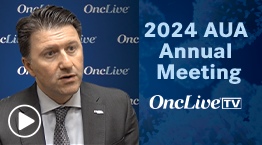Dr. Papadimitrakopoulou on Biomarker-Driven Clinical Trials in NSCLC
Vassiliki Papadimitrakopoulou, MD, professor, Department of Thoracic/Head and Neck Medical Oncology, The University of Texas MD Anderson Cancer Center, discusses biomarker-driven clinical trials in non–small cell lung cancer.
Vassiliki Papadimitrakopoulou, MD, professor, Department of Thoracic/Head and Neck Medical Oncology, The University of Texas MD Anderson Cancer Center, discusses biomarker-driven clinical trials in non—small cell lung cancer (NSCLC).
For thoracic oncologists to do better with immunotherapy, they need to better select patients for clinical trials, Papadimitrakopoulou says. More emphasis is also needed on biomarker work in clinical trials because there is concrete evidence that this ultimately leads to improved outcomes. In the KEYNOTE-024 and CheckMate-227 studies, PD-L1 expression and tumor mutation burden, respectively, emerged as biomarkers for immune response. Additional biomarkers predictive of response to single agents and combination therapies would be useful.
Another strategy to consider are neoadjuvant clinical trials that are able to provide enough materials at surgical resection for researchers to identify the mechanism of the drug. Umbrella clinical trials—where patients are allocated into groups based on the therapy they are most likely to derive benefit from—are also a good strategy, Papadimitrakopoulou says.



